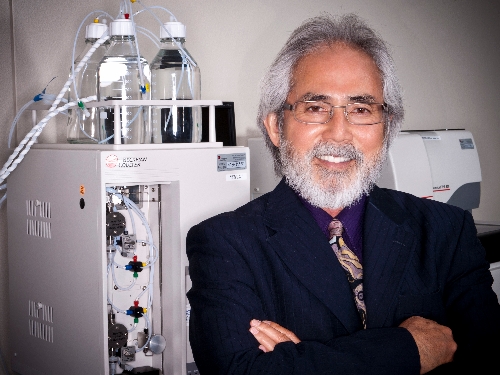Grant opens mentoring and research program opportunities to NSC students
Big vision. Small scope.
When Nevada State College began providing hands-on training with the equipment used by leading biotechnology firms, it was a grand vision in support of a small number of students. Costs prevented larger numbers from participating.
Recently, however, thanks to a dramatic increase in grant funding from the Nevada Idea Network of Biomedical Research Excellence, the scope of the project now matches the size of the vision. In the coming years, well over 150 students will benefit from this unique opportunity, in the process opening doors to an exciting array of careers in the biotechnology and biomedical fields.
"Nevada State College is the first in the nation to offer this training to undergraduate students," said Dr. Andy Kuniyuki, dean of the liberal arts and sciences. "This is a tremendous success because there is a great demand for biotech employees to know capillary electrophoresis."
Capillary electrophoresis involves separating polar molecules as they migrate through an electrical field. It is a cutting-edge technology that is important in developing and producing safe and stable pharmaceutical products. What this grant means is that more NSC students can access summer scholarships and participate in long-term research experiences that enhance their marketability and training in science.
Before this expansion, Nevada State College received INBRE grant support to provide specialized certification and training on unique biomedical instrumentation for NSC students as well as other institutions in the Nevada System of Higher Education. In September, NSC's grant support was expanded to facilitate undergraduate research projects guided by faculty in the physical and life sciences. The increase in support is impressive, from $29,975 per year to $167,870 per year for the next three years. Such support will strengthen existing training workshops and allow students to take part in genuine experimental science opportunities by providing summer scholarships and full-time research mentorship.
The INBRE project, which is funded through the National Center for Research Resources at the National Institutes of Health, is housed in the University of Nevada School of Medicine under the direction of Dr. James Kenyon in the department of physiology and cell biology.
The project began in 2005 with the goals of increasing biomedical research infrastructure in Nevada and establishing a network linking Nevada's biomedical research (the University of Nevada Reno, the University of Nevada, Las Vegas, and the Nevada Cancer Institute) with educational institutions (Nevada State College, Great Basin College, Truckee Meadows Community College and the College of Southern Nevada).
During the first five years (2005-2010) of the project, the NV INBRE supported biomedical researchers and established a series of statewide research service cores in bioinformatics, proteomics, cytometry, confocal imaging, histology, and live animal imaging. In addition, the INBRE established and developed a Biomedical Students Pipeline program that mentors under-represented students enrolled in Nevada community colleges.
The INBRE project received a five-year renewal of this grant, valued at $16 million, to run from 2010-2015. The focus of the current cycle is to build on the infrastructure developed during the first five years, to build new programs based on new National Institutes of Health initiatives in clinical translational research and to develop more programs to serve undergraduates and encourage high school students to pursue degrees in the sciences.
Nevada INBRE will further develop the research base and capacity at the biomedical research institutions by hiring new researchers and providing research and mentoring support to faculty, postdoctoral fellows and graduate students. In addition, this component of the NV INBRE will be expanded to include translational research and community engagement projects. The Biomedical Students Pipeline will be enhanced by increasing mentoring and research programs for undergraduate students and adding programs at Nevada State College and Great Basin College.
This recent grant was a part of the 2010-2015 renewal that first brought support for NSC's certification workshops on biomedical instrumentation (the last one was conducted May 7-10). Students are being trained in capillary electrophoresis, a powerful method that separates polar molecules, such as therapeutic drugs or biological compounds, based on their migration in an electrical field. The resolution is so precise that the Food and Drug Administration requires this signature in every step for pharmaceutical development to ensure purity of the compound.
Every major biotechnology company engaged in new drug development has multiple capillary electrophoresis instruments but is having difficulty finding enough people with expertise in running these instruments. Nevada State College has been fortunate to receive support from the NV INBRE grant to bring to campus representatives from Beckman Coulter, an industry leader in this technology, to train Nevada System of Higher Education students. The Beckman Coulter certification of training is a gateway to employment in this exciting field.

















